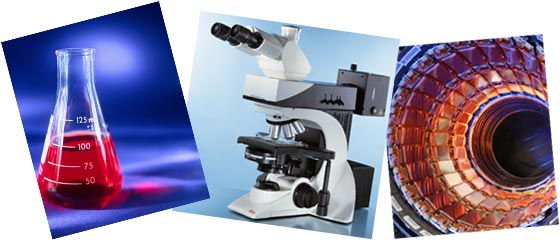 ![[Header]](../XuShared2/Line3.jpeg)

Add a Comment (Go Up to OJB's Blog Page) PrecisionEntry 252, on 2005-11-19 at 14:00:41 (Rating 1, Science) I recently listened to a podcast about a NASA space probe, Gravity Probe B, which has just finished measuring the shape of space-time in the immediate vicinity of Earth. A prediction of Einstein's relativity is that space-time should be twisted because of the movement of Earth. Relativity is about 100 years old now, but it has passed every test thrown at it, and is one of the most reliable theories in physics, so of course many scientists would love to prove some part of it wrong!
But the effect being investigated is extraordinarily difficult to measure because it is so small. The measurement can be done using a spinning gyroscope, which should stay pointed in the same direction indefinitely, unless this twisted time-space exists which will cause a slight drift. But the drift is tiny: just 0.041 arc seconds (0.00001 degree) in a year!
To prevent imperfections in the gyros themselves causing drift they have to be manufactured with incredible precision. The 1.5 inch diameter spheres (the most perfect ever made) don't vary from perfection by more than the width of 40 atoms (0.00000000001 inches)! To cater for this the precision of the satellite itself also had to go away beyond anything attempted before - 0.0005 arc seconds (0.0000001 degree). Imagine the thickness of a sheet of paper. Now take the paper 100 miles away, how thick does it look? That's how much 0.0005 arc seconds is!
This experiment is so difficult and will take a further year just to analyse the data the satellite has produced during the year the experiment was running. If a definite result can be extracted (and no unexpected faults occur in the methodology) either a positive or negative result will be significant. Obviously a negative result will be more interesting, because it will show a problem with relativity, but I think most people expect the great theory to be confirmed yet again. Either way, the experimenters should be proud of producing an instrument of such exquisite precision!
 There are no comments for this entry. 
You can leave comments about this entry using this form. To add a comment: enter a name and email (both optional), type the number shown above, enter a comment, then click Add.
Note that you can leave the name blank if you want to remain anonymous.
Enter your email address to receive notifications of replies and updates to this entry.
The comment should appear immediately because the authorisation system is currently inactive.
![[Comments]](../XuShared/Comment1B.jpeg) ![[Preview]](../XuShared/Comment6B.jpeg) ![[Blog]](../XuShared/Up2B.jpeg)
|

![[Comments]](../XuShared/Comment1B.jpeg)
![[Preview]](../XuShared/Comment6B.jpeg)
![[Blog]](../XuShared/Up2B.jpeg)